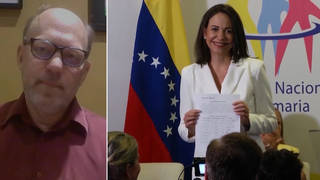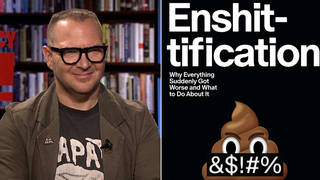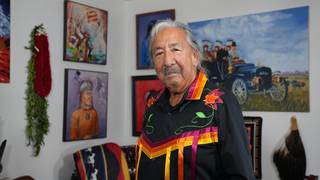
Guests
- Annie LinskeyWashington, D.C., deputy bureau chief for The Boston Globe. Her recent piece is titled “Ethnicity not a factor in Elizabeth Warren’s rise in law.”
Senator Elizabeth Warren has come under fire since releasing a DNA test Monday showing Native American ancestry. The announcement responded directly to President Trump, who has frequently attacked Senator Warren by calling her “Pocahontas.” A Stanford professor of genetics says there is “strong evidence” of Native American lineage in Warren’s family tree dating back six to 10 generations. At multiple points in her career, Warren identified as Native American, but she says she did not use the claim to advance her career. We speak with Annie Linskey, Washington, D.C., deputy bureau chief for The Boston Globe. She examined hundreds of documents to determine that ethnicity was “not a factor” in Warren’s rise in academia and law.
Transcript
NERMEEN SHAIKH: The midterm elections are less than three weeks away, but two of the top contenders for the 2020 presidential election are already sparring on the national stage, after Senator Elizabeth Warren released a DNA test Monday showing Native American ancestry. The announcement responded directly to President Trump, who has frequently attacked Senator Warren by calling her “Pocahontas.” Senator Warren has said she will consider a 2020 presidential run after the midterms.
AMY GOODMAN: A Stanford professor of genetics says there is “strong evidence” of Native American lineage in Warren’s family tree dating back six to 10 generations. This is Dr. Carlos Bustamante speaking in a video released by Senator Warren Monday, when she released her DNA test.
CARLOS BUSTAMANTE: In the senator’s genome, we did find five segments of Native American ancestry with very high confidence, where we believe the error rate is less than one in a thousand.
SEN. ELIZABETH WARREN: Now, the president likes to call my mom a liar. What do the facts say?
CARLOS BUSTAMANTE: The facts suggest that you absolutely have a Native American ancestor in your pedigree.
SEN. ELIZABETH WARREN: I’m not enrolled in a tribe, and only tribes determine tribal citizenship. I understand and respect that distinction, but my family history is my family history.
AMY GOODMAN: That was Senator Elizabeth Warren, who has said her mother told her she was part Cherokee and part Delaware. At multiple points in her career, Warren identified as Native American. But in the video she released Monday, her former colleagues say she never claimed Native American ancestry when applying for jobs to gain benefit.
UNKNOWN: Do you remember her heritage ever coming up during the hiring process?
RANDALL KENNEDY: No.
OLIN WELLBORN III: No.
JAY WESTBROOK: No. Her heritage had no bearing on her hiring, period.
DOUG LAYCOCK: I was chairing the committee that year. If ethnicity had been part of the discussion, I would have known about it.
RANDALL KENNEDY: Her name, with respect to racial minority hires? No, never.
NERMEEN SHAIKH: At a July 5th rally in Montana, Donald Trump offered to donate a million dollars to Senator Warren’s favorite charity if a DNA test proved her claims of Native American ancestry.
PRESIDENT DONALD TRUMP: I will give you a million dollars, to your favorite charity, paid for by Trump, if you take the test and it shows you’re an Indian. You know.
NERMEEN SHAIKH: But following the release of Warren’s DNA test Monday, Trump denied that he’d ever made these claims.
REPORTER: Mr. President, any reaction to Senator Elizabeth Warren releasing the results of her DNA test?
PRESIDENT DONALD TRUMP: No, I have no—
REPORTER: Are you going to pay $1 million—
PRESIDENT DONALD TRUMP: Who—who cares?
REPORTER: Mr. President, you said you’d give—
PRESIDENT DONALD TRUMP: Who cares?
REPORTER: —one million dollars to charity.
PRESIDENT DONALD TRUMP: I didn’t say that. No, I didn’t. You better read it again.
AMY GOODMAN: Well, for more, we go to Washington, D.C., where we’re joined by Annie Linskey, deputy bureau chief for The Boston Globe. She examined hundreds of documents to determine that, quote, “Ethnicity [is] not a factor in Elizabeth Warren’s rise in law.”
Annie Linskey, welcome to Democracy Now! You did an extensive investigation. Can you talk about what led up to Senator Warren’s release of the video and the DNA test on Monday? But first talk about what you found, all the people that you interviewed, what the allegations are and what people said to you.
ANNIE LINSKEY: Hi there. Sure, happy to. So, you know, at The Boston Globe, we had been asking for years—for six years, really—for Elizabeth Warren to release her personnel records, really from Harvard and the University of Pennsylvania, where she had been a law professor. And the reason that we were so eager to look at these files is there’s been this long-running allegation against her that she checked the box and used her Native American history as a reason to get ahead, and so that’s always been the allegation.
And the reason for it is, back—I think it was in ninety—or, excuse me, '87, when she was at the University of Texas as a professor, she started calling herself a minority, listing herself as a minority in a law directory. And the very next year, she gets this really big job as a law professor at an Ivy League institution. And so the idea was, oh, my goodness, the moment she identifies herself as a minority professionally, that's when this big promotion comes. And then, a few years later, she goes on to an even bigger institution, to Harvard. So we went back and we looked at as many documents as we could find, and to find out: I mean, was there some correlation there? Because on the face of it, it looks like there could be.
But when you look at—you know, starting with the University of Pennsylvania, we were able to find a document that had never before been reported. It was a 10-page equal opportunity memo that the University of Pennsylvania had to fill out when they hired Warren, and they had to fill it out because they saw themselves as hiring a white woman. And so they had to, you know, in the course of 10 pages, go through this giant pool of applicants that they had looked at for this position, break them down by sex, by minority—the number of black applicants, the number of Asian applicants, the number of Native American applicants—and then say, “Look, after looking at all of these people, we ended up hiring a white woman, Elizabeth Warren, because we could not find an equal or better minority for the job.” And that’s quoted in the report. And so, to me, that pretty much solved the issue for University of Pennsylvania. Clearly, she was not a minority hire if the hiring committee there was having to argue to hire her as a white woman.
So, that then takes you to Harvard. After a few years at Penn, she goes—she teaches at Harvard in '93 as a visiting professor, which is this sort of weird thing that law schools do. They have you come when they're looking at hiring you, and you have like this year-long job interview. So she taught for a year at Harvard, and they loved her. And they did an unusual thing, which is offer her a job, you know, while she was still there and still teaching in '93. And she initially turned that job down. She wasn't really gunning for it. There were a number of reasons, but she turned it down.
But at Harvard, you really wanted to see: Is there was a similar form? You know, is there a similar EEOC form that Harvard had to fill out? And if there was one, I just couldn’t find it. So, to look at Harvard and understand, did they hire her because of her Native American heritage, I instead had to look at this vast hiring committee. And the way it works at Harvard is tenured law professors get to vote on who can join their staff, kind of who can join the club. And they had these two meetings about Elizabeth Warren and sort of picking apart her scholarship, trying to figure out: Do we want this woman on our staff?
And so I tracked down every single living person who would have been in that meeting, and tried to interview all of them to see if I could find anybody who said, “Yeah, we saw her—she was Native American, and we wanted a Native American on the staff.” And of the ones I was able to talk to, most of them said they had no idea that she had this Native American heritage. And there was only one person who said, “Yeah, this might have come up, but it’s not why we hired her. We did not see her as an affirmative action hire.” So the professors who hired her were fairly clear on this.
The other thing that was really interesting is I talked to some of the students, because at Harvard at the time, it was just lily-white. I mean, there were, I think, four or five black professors, and that was essentially it in terms of Harvard Law School staff. The students at the time were really agitating for more diversity in faculty, and so there were protests outside of the meeting where Warren was hired. And students were very pleased at the end of the day when word came out that they had hired Elizabeth Warren, a woman, but the students who were interviewed at the time by The Harvard Crimson said they were upset that it was a white woman. Why not hire a black woman or an Asian woman or a Hispanic woman? This was the debate that was going on in the campus. And the student activists who were most attuned to it—yes, they were pleased that there was a little bit more gender diversity with Warren’s hire, but they were still angry that a woman of color hadn’t been hired. So, I mean, to me, that also says, you know, if she was pushing this as a reason to get hired, she definitely wasn’t doing a very good job.
NERMEEN SHAIKH: Well, Annie, thank you. If you could just say again, just to clarify, the exact years and institutions in which Elizabeth Warren identified herself as Native American?
ANNIE LINSKEY: Right.
NERMEEN SHAIKH: Because, as you know, her critics point out that if she didn’t do it to advance herself professionally, why did she do it at all? And that, you know, even if her family was speaking to her about her heritage, what reason did she have, in the moment that she decided, to declare that on official documents?
ANNIE LINSKEY: Yeah, this is where it gets complicated for Warren. So, if you sort of take—if you accept that she did not get ahead because of this, the question, though, is, when she was at the University of Pennsylvania from, I believe it was, '87 to ’95—I might be a little wrong on that—when she was there, two years after being hired as a white woman at the University of Pennsylvania, she does something very unusual, which is she has her ethnicity code changed in the University of Pennsylvania's HR system. That does something for the University of Pennsylvania. It allows them to report that they have a more diverse faculty than they have. And the University of Pennsylvania, like all major institutions, was under pressure to hire and have diverse faculties. So, she does this for some reason.
She does the same thing at Harvard. So, when she’s later hired at Harvard—you know, of course, your HR forms don’t transfer from one university to the next; she has to refill them all out. And about two years after she got the job offer at Harvard and a good three or four months after she started working at Harvard in '95, you also saw—I also saw documentary evidence that her ethnicity code changes to Native American. And that's when Harvard starts reporting to the federal government that they have a Native American law professor on staff.
So, in both instances, she did proactively make a change, and that change was used by these two institutions to argue, “Hey, look, we’re not as bad as it may seem diversity-wise, because we do have this professor who’s Native American.” So, that’s certainly complicated for her. You know, I asked her about that, and you don’t have—I don’t have a satisfying answer from her about why she did it. I mean, she says to this day she does not specifically remember making those changes. And she says that she’s thought back to that time in her life, that the matriarchs of her family, her mother and her mother’s sisters, were getting older, and they were starting to talk more about family heritage, and they were dying. And so, what she’s saying to me is that she kind of felt this sense that she—this sort of growing pride in her roots.
And at the same time, if you think about her life, she grew up in Oklahoma, she went to—graduated from school in Texas, and now, all of a sudden, she’s sort of thrust for the first time in this Ivy League environment, and her sort of character is to sort of double down on who she is, rather than kind of try to fit in at these institutions. So, I think that’s part of it. I mean, I talked to people at the University of Pennsylvania who would say that she liked to identify as an Okie and would use that word a lot. And so, you know, her explanation really is that this was sort of an expression of the identity that she was trying to put out in the world.
But, you know, I think it’s a fair criticism when you look at how these universities were using that statistic, and particularly Harvard, which was so completely lily-white at the time. Harvard was arguing that, “Hey, look, we have a diverse staff, because we have, as it turns out, this woman Elizabeth Warren, who’s Native American.”
AMY GOODMAN: So, let me go back to an old Harvard Crimson, the university paper, article.
ANNIE LINSKEY: Yeah.
AMY GOODMAN: A law school spokesman tells The Harvard Crimson in 1996, “Of 71 current Law School professors and assistant professors, 11 are women, five are black, one is Native American and one is Hispanic.” That’s with Elizabeth Warren being that one Native American. A Crimson editorial from 1998 refers to Warren as the law school’s one tenured minority woman. Politico also reports that a '97 Fordham Law Review piece described her as Harvard Law School's “first woman of color.” Annie Linskey?
ANNIE LINSKEY: Yeah. I mean, that’s a problem. And that is a problem that Harvard had, in that they were willing to go out and tout Elizabeth Warren as a—their woman of color. And the context at the time is really interesting. I mean, Harvard in 1993, when Elizabeth Warren was hired, had not hired a single woman of color to their faculty. They had not hired a single person. In Harvard’s 200-year history, no woman of color was hired. And that didn’t change until, I believe, ’97 or ’98. But I will say, when they make their—finally, an African—they hired an African-American woman, Harvard did make an enormous deal about it.
But, you know, I think that this is where this problem comes, is Harvard was out there touting her as Native American. I will say, the University of Pennsylvania took a very different approach. I talked to the dean there about this, and he was like, “No, no, no. We were not going to do that. You know, if Elizabeth Warren wanted to be Native American on our rolls, on our statistics, that’s fine, but there was no way we were going to walk out and suggest that she was a Native American law professor.” So the two universities took a very different approach.
NERMEEN SHAIKH: But, Annie, you know, a lot of her critics, the critics of her decision to come out as Native American, say that she basically—her presence at these universities sanctioned the universities, allowed them to not hire other Native Americans because they had one. Is that true? Is that what you learned?
ANNIE LINSKEY: I think that’s where it gets problematic for her. I mean, that has not been a criticism that’s been leveled. I think when she’s going into a Democratic primary with Cory Booker or with Kamala Harris and with a very diverse electorate in the Democratic Party, she’s going to have to have a very good answer for that. When I asked her that very question, she says that she was doing a lot of work to promote women and to promote minority hires. But I think that that is where it becomes more problematic for her, because her allowing Harvard, in particular, to use her, to use this ethnicity claim—you know, if you look at the statistics, they were arguing internally, “Oh, we’re doing much better with minority status than our own measurements want us to be doing.” And so, sort of internally, they were saying, “Oh, we’re doing fine.” Externally, Harvard was still saying, “We need to do better,” for the most part. So, yeah, I mean, that is—I think that is an area that’s going to be really complicated for her.
AMY GOODMAN: Finally, Annie Linskey, you have been speaking to Senator Warren after she released the DNA test and the video.
ANNIE LINSKEY: Yeah.
AMY GOODMAN: You’ve spoken to her husband, Bruce Mann—
ANNIE LINSKEY: Yeah.
AMY GOODMAN: —about the effects of what this has meant. And you’ve covered the response to the release of the DNA test.
ANNIE LINSKEY: Yeah. Yeah, yeah, I have. And this has been a fascinating few days, really. You know, it was a big surprise, I think, to many people that Elizabeth Warren was willing to kind of undergo this DNA test and do it and put the results out there. I think it’s a little early to know what the impact of it is going to be on her political future. But I also think—I mean, she has been harangued and questioned on this for more than a year, and her approach to this is quite different than, say, Hillary Clinton. I mean, her idea is like, “Look, I took this test. Look, it does actually show that”—this is the first proof that she has been able to produce that her family’s stories were true and that there was Native American ancestry in her family. So, this is the first time in six years that there’s been something beyond a family lore to rely on for this claim.
Although, I mean, for critics, they’re saying, “My goodness, it’s so far, far, far, far back. Does it really count?” And so people will have to make that decision for themselves. I just—I know that this is one of those questions. Every time I write about Elizabeth Warren, I would get so many emails about, “Why doesn’t she just take a DNA test?” I mean, you know, they would be from across the board. It didn’t feel like the sort of normal operative-generated type of emails. They would just be from regular people. I got so many from one story, I actually had to create like a form email to respond to them all. So my guess is that she was getting a similar amount of questions from her constituents, and I guess this is the way that she decided to deal with it, which is very different from how a lot of candidates would. And we’ll see whether it was wise or not.
NERMEEN SHAIKH: Well, Annie, it seems, very quickly, that—
ANNIE LINSKEY: Yeah.
NERMEEN SHAIKH: —she has, maybe for other reasons, expressed regret about her decision on releasing the—taking the DNA test and releasing it, saying, “I wish I had been more mindful of the distinction between heritage and tribal citizenship.” Is it your sense that she has been regretful for this reason?
ANNIE LINSKEY: No. I mean, I don’t think she regrets doing this—I have no indication that that’s the case at all. I mean, I think what she regrets is—my sense would be that she regrets calling herself Native American at Harvard and at Penn. I mean, I think that’s where her—she’s learned a lot more about ethnicity and about how tribal membership works and how a family’s story is not the same as having the experience of being a member of a tribe. But, you know, the idea that she regrets doing the DNA test, I have not heard that from anyone.
AMY GOODMAN: Annie Linskey, I want to thank you for being with us, Washington, D.C., deputy bureau chief for The Boston Globe. We’ll link to your piece, “Ethnicity [is] not a factor in Elizabeth Warren’s rise in law.”
After break, we host a roundtable discussion with Ojibwe lawyer Tara Houska, Indian Country Today editor Mark Trahant and Gyasi Ross, an author and member of Blackfeet Nation. This is Democracy Now! Back with them in a moment.











Media Options